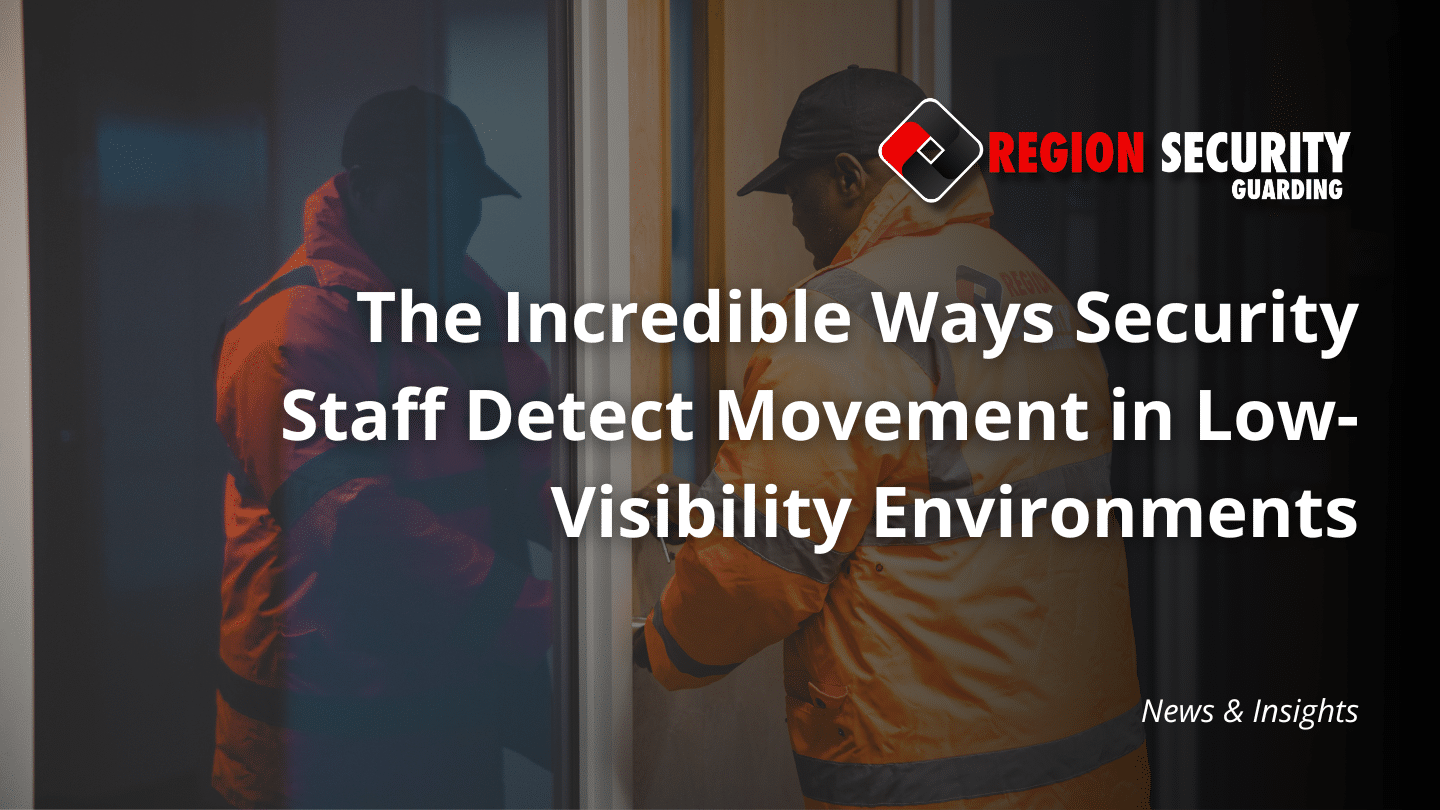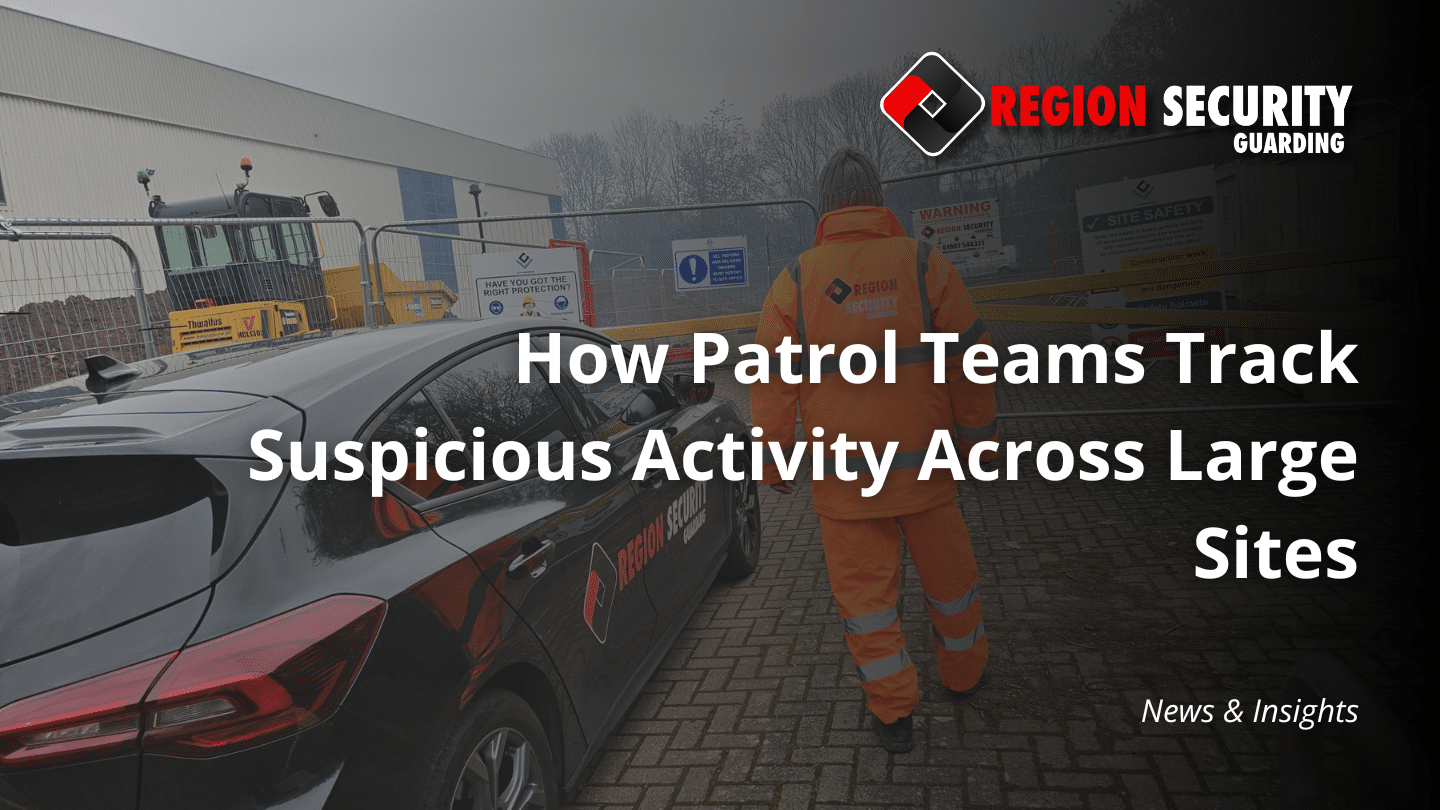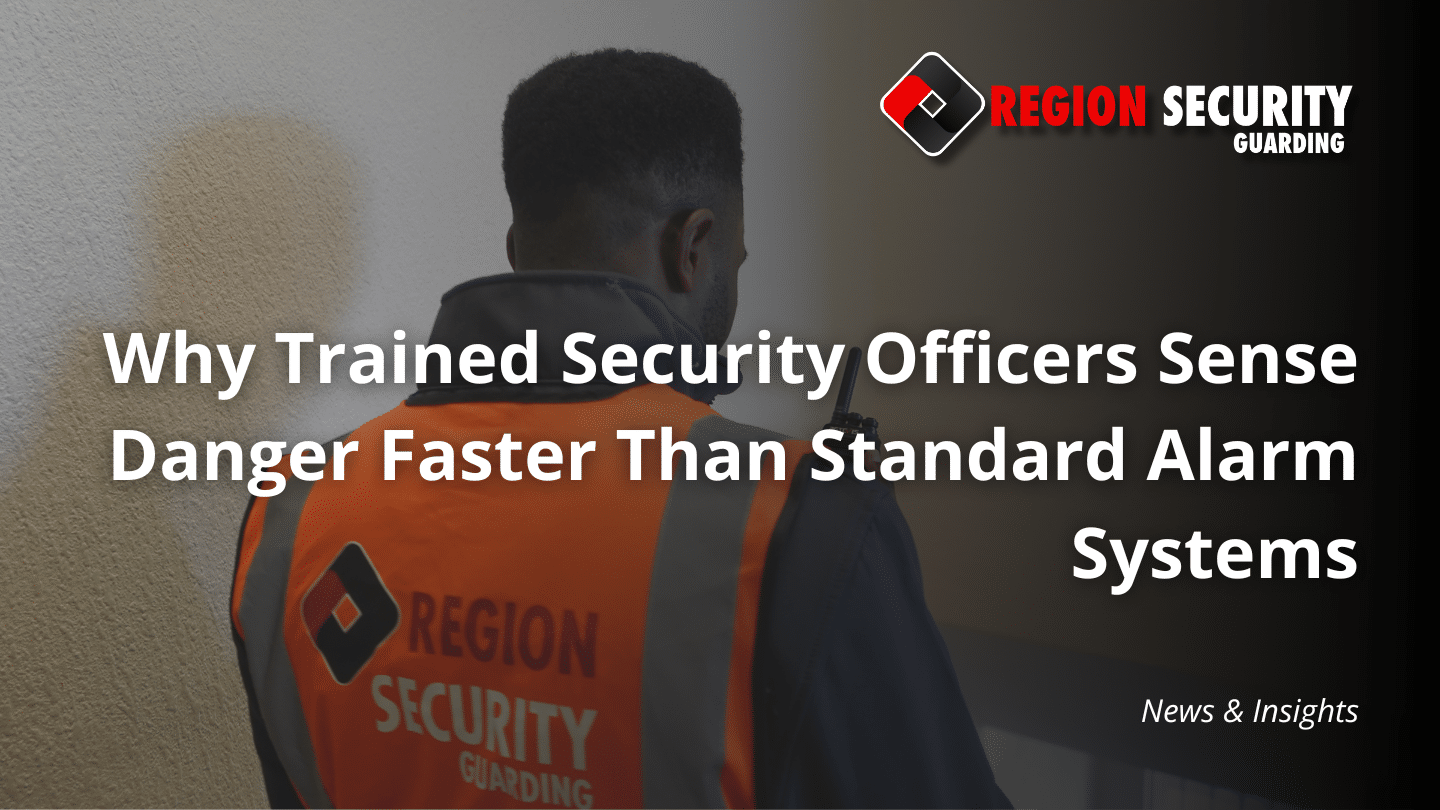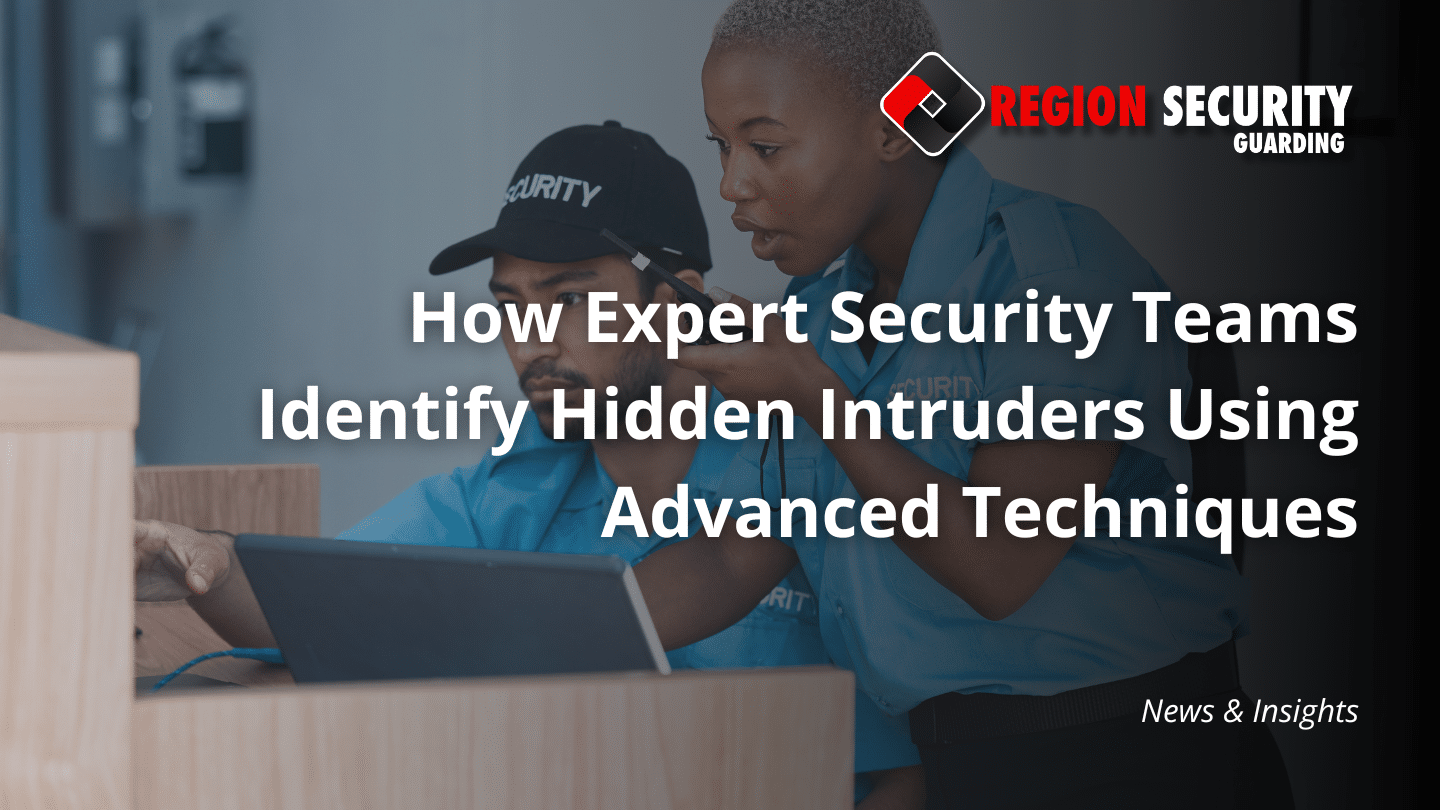Most alarms react only after something goes wrong. But people don’t. Trained security officers notice tension in a crowd, a strange pause, or a quiet shift in behaviour that machines miss.
Their quick read of a situation can stop trouble before it grows. When their watchful eye works alongside advanced security monitoring in Birmingham, you get protection that feels alert, human, and immediate.
This blog looks at why these officers sense danger so fast, and why that awareness gives your site a stronger, smarter layer of safety.
Table of Contents
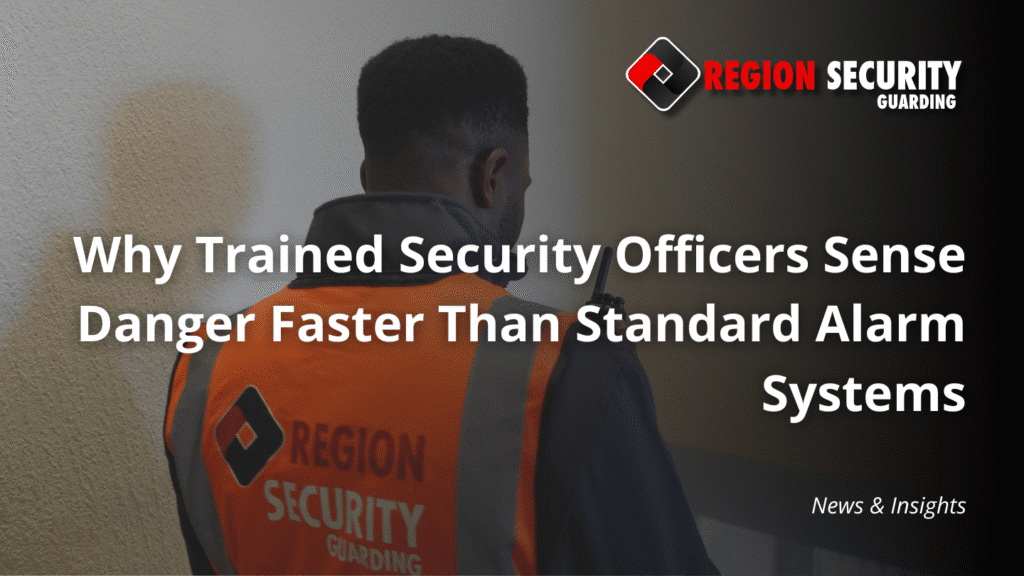
Limitations of Standard Alarm Systems in Early Threat Detection
Mechanical Detection Delays and Trigger Dependencies
Standard alarms react only after a clear physical event. A door must open, glass must break, or motion must cross a set line. This creates a built-in delay.
If the trigger does not trip, the system stays silent. Many alarms miss early signs because they rely on fixed rules. Even industry reports highlight this weakness.
For example, the U.S. Department of Justice notes that 94–98% of alarm alerts reported to police are false, often caused by non-threat events. This shows how much these systems depend on narrow triggers, rather than reading risk as it grows.
Security Officer vs Alarm System: A True Capability Comparison
When you look at security officer vs alarm system performance, the gap becomes clear. A device follows code. A person follows instinct. Machines wait for a programmed cue, but a trained officer spots trouble from tone, posture, or sudden shifts in behaviour.
This difference is why the officer vs alarm system comparison always leans toward human awareness in early detection.
In a study by ASIS International, trained officers identified suspicious behaviour up to 40% faster than automated systems in live tests.
Their judgment does not freeze when a situation changes. They adapt in the moment. Alarms can only respond after something has already crossed a line.
Understanding How Humans Detect Risk Before Technology
The Biology Behind Human Threat Detection
Human threat detection begins long before a person can explain what feels wrong. The brain reacts fast to small clues like a stiff jaw, a shaky step, or a quick change in tone.
These signs are tiny, yet the mind links them to past danger. A trained officer learns to trust this first spark. Their senses work in short bursts, picking up tiny actions that a device would ignore. This instinct gives them an early push to act before trouble grows.
Sensory Input and Emotional Intelligence in Trained Security Officers
Officers read a place with steady eyes and quick senses. They track sounds, movement, and the flow of a crowd.
When a pattern shifts, they catch it at once. Much of this happens in the background, almost like a quiet pulse. Their emotional sense adds more depth.
A glance, a tense breath, or a sudden change in mood can warn them faster than any alarm. This mix of sharp senses, quick reads, and calm judgment forms a strong style of human threat detection that reacts early and adapts fast.
Dedicated Human-Led Detection: Advanced Security Monitoring in Birmingham
Advanced security monitoring in Birmingham is strongest when real people lead the watch. An alarm waits for a set trigger. A trained team read slow shifts in mood, movement, and intent.
This lets them act before trouble reaches a clear point. The mix of tech and human judgment gives sites in the city a faster and steadier line of defence.
A sharp officer uses security guard situational awareness to spot small signs like hesitation, pacing, or odd routes through a space. These moments hint at risk long before alarms react.
With proactive danger recognition, teams can move early, guide responses, and stop issues while they are still quiet.
Local Sectors That Gain the Most
Birmingham’s key industries rely on this human-led approach:
- Logistics: Officers notice wrong drop-off patterns or strange stops near loading bays.
- Retail centres: They read crowd tone, group behaviour, and early theft cues.
- Construction sites: They spot unsafe access attempts and after-hours wanderers.
- Student accommodations: Quick reads of mood and visitor behaviour prevent early tension from rising.
- Corporate buildings: Body language and tone shifts alert officers before a risk becomes clear.
This blend of instinct and modern tools gives each sector stronger protection than alarms can offer alone.
Real-World Scenarios Where Officers Sense Danger First
Human Reactions That Reveal Hidden Risks
On many sites, officers notice danger long before an alarm even stirs. In busy shopping areas, they catch quick glances toward exits or rushed movements near high-value goods.
In loading yards, a driver who lingers without a clear reason raises suspicion at once.
Student housing sees the same pattern: an unfamiliar person waiting in a hallway or checking doors makes an officer step in early. These small reactions give trained security officers time to move, question, and prevent issues before they break open.
Environmental Shifts That Machines Fail to Read
People read surroundings in a way machines cannot match. On building sites, a guard spots fresh marks on a fence or a new gap in a barrier, signs that someone has tested access.
Inside offices, a person standing too close to secure areas without a badge draws attention fast. Even slight changes in foot traffic, sound, or lighting can hint at trouble.
Officers use these clues to act early, giving each site stronger protection than any alarm based only on fixed triggers.
Benefits of Integrating Human Skill With Technology for Stronger Security
When trained officers work with modern systems, each side covers what the other cannot.
Tech keeps a steady watch and pulls in clear data, while officers read tone, intent, and the flow of a scene in real time. This mix helps teams act early, even when the warning signs are soft or unclear.
It also reduces guesswork, since people can sort out odd moments that would confuse a programmed system.
Together, they reveal risks at different stages and guide faster, sharper decisions. This blended approach builds stronger protection than relying on alarms or human presence alone.
Conclusion: The Detection Advantage Only Humans Provide
Trained officers sense danger early because they read intent, not only movement. Their instinct fills the gaps machines miss. Alarms react late, but people notice tension the moment it appears.
When this human insight pairs with advanced security monitoring in Birmingham, sites gain faster responses and stronger control. Real protection comes from this mix of steady tech support and sharp human judgment.
FAQs
1. Why do trained security officers detect danger earlier than alarms?
They spot intent and tension through subtle cues that systems cannot read. Their quick judgment helps them act before a threat forms.
2. Do alarms replace the need for human monitoring?
No. Alarms follow fixed triggers, while people notice risks that fall outside normal behaviour. Using both creates stronger protection.
3. How does situational awareness help prevent incidents?
It guides officers to notice small shifts in movement, tone, or space, allowing them to step in before problems build.
4. Can proactive danger recognition prevent crime before escalation?
Yes. Early checks often prevent small concerns from turning into serious events.
5. Is human-led monitoring more effective for Birmingham businesses?
Yes. Local sites gain clearer insight and faster action when skilled officers support modern monitoring systems.
Business Security You Can Rely On
Trusted by leading businesses nationwide for reliable, 24/7 protection.
or call 0330 912 2033

We have used Region security for quite a while now. Top notch service, great guards and helpful staff. We love our guards and the team for all of their help / work. No need to try the other companies at all."
Andy Yeomans - Jones Skips Ltd
Great company, professional services, friendly guards and helpful at times when required."
Rob Pell - Site Manager
A professional and reliable service. Always easy to contact and has never let us down with cover. No hesitation in recommending and competitively priced also. After using an unreliable costly company for several years it is a pleasure to do business with Region Security"
Jane Meier - Manager
Region Security were very helpful in providing security for our building. We had overnight security for around 4 months. The guards themselves were professional, easy to reach and adapted very well to our specific needs. Would definitely recommend Region for security needs.
Lambert Smith Hampton
Great service. Reliable and professional and our lovely security guard Hussein was so helpful, friendly but assertive with patients when needed. He quickly became a part of our team and we would love to keep him! Will definitely use this company again
East Trees Health Centre
Fantastic Service from start to finish with helpful, polite accommodating staff, we have used Region Security a few times now and always been happy with what they provide.
Leah Ramsden - Manager

